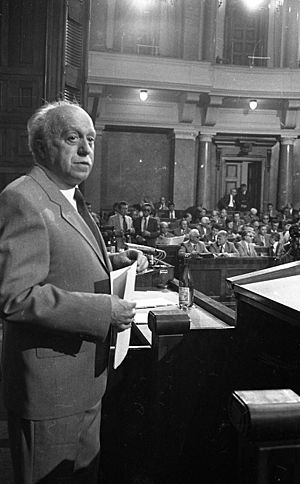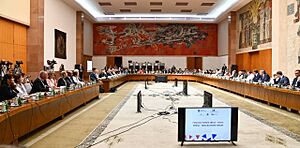Mitja Ribičič facts for kids
Quick facts for kids
Mitja Ribičič
|
|
|---|---|
 |
|
| 5th President of the Presidency of the League of Communists of Yugoslavia | |
| In office 29 June 1982 – 30 June 1983 |
|
| President | Petar Stambolić Mika Špiljak |
| Prime Minister | Milka Planinc |
| Preceded by | Dušan Dragosavac |
| Succeeded by | Dragoslav Marković |
| 22nd President of the Federal Executive Council | |
| In office 18 May 1969 – 30 July 1971 |
|
| President | Josip Broz Tito |
| Preceded by | Mika Špiljak |
| Succeeded by | Džemal Bijedić |
| Personal details | |
| Born | 19 May 1919 Trieste, Kingdom of Italy |
| Died | 28 November 2013 (aged 94) Ljubljana, Slovenia |
| Nationality | Slovene |
| Political party | League of Communists of Yugoslavia (SKJ) |
Mitja Ribičič (born 19 May 1919 – died 28 November 2013) was an important Slovene leader and Yugoslav politician. He was the only person from Slovenia to become the prime minister of the Socialist Federal Republic of Yugoslavia. He served in this role from 1969 to 1971.
Contents
Early Life and Education
Mitja Ribičič was born in Trieste, Italy, on May 19, 1919. His family spoke Slovene. His father, Josip Ribičič, was a well-known Slovene writer. His mother, Roza Ribičič, was a teacher and a public figure.
In 1925, when Mitja was six, his family moved to Rakek, Slovenia. At that time, Slovenia was part of the Kingdom of Serbs, Croats and Slovenes, which later became Yugoslavia. He went to elementary school there. In 1929, his family moved again, settling in Ljubljana, the capital of Slovenia.
Mitja Ribičič started studying law at the University of Ljubljana in 1938. During his time as a student, he joined several youth groups. These groups often supported social change and helped Slovene people who had moved from other areas.
World War II and Political Beginnings
In April 1941, during World War II, Yugoslavia was invaded. Mitja Ribičič joined the Royal Yugoslav Army to defend his country. After Yugoslavia was defeated, he joined the Liberation Front of the Slovenian People. This group worked to resist the occupation.
In October 1941, he became a member of the Yugoslav Communist Party. This was an important step in his political career.
In May 1942, he joined the Partisan resistance movement. He fought in different parts of Slovenia that were under German control. He served in areas like Lower Styria, Upper Carniola, and southern Carinthia. In November 1944, he went to the Soviet Union for special training.
Post-War Career and Leadership
After returning in early 1945, Mitja Ribičič became a high-ranking official. He worked for the Yugoslav military intelligence and later for the secret police. His job involved maintaining security and order in Slovenia.
From 1951 to 1952, he served as the chief prosecutor for Slovenia. After that, until 1957, he was the Secretary of the Interior for Slovenia. This role meant he was in charge of internal affairs and security.

Between 1957 and 1963, Mitja Ribičič was a member of the Slovenian government. He then became a member of the Central Committee of the Communist Party of Slovenia. This was a key leadership position.
In 1966, he rose to a top leadership role in the Yugoslav Communist Party. He first served on the Executive Central Committee. Later, he became the president of the Yugoslav Federal Executive Council. This made him the head of the government for all of Yugoslavia.
From 1974 to 1982, he led the Socialist Union of the Working People of Slovenia. This organization brought together many different groups and associations in Slovenia. Between 1982 and 1983, he became the president of the Central Committee of the Communist Party of Yugoslavia. He remained a member until 1986, when he retired from politics.
Mitja Ribičič passed away on November 28, 2013, in Ljubljana, at the age of 94. He is buried in the family grave at Žale cemetery in Ljubljana. His son, Ciril Ribičič, is also a politician and a lawyer. As of 2013, Ciril was a member of the Slovenian Constitutional Court.
See also
 In Spanish: Mitja Ribičič para niños
In Spanish: Mitja Ribičič para niños
 | Percy Lavon Julian |
 | Katherine Johnson |
 | George Washington Carver |
 | Annie Easley |

